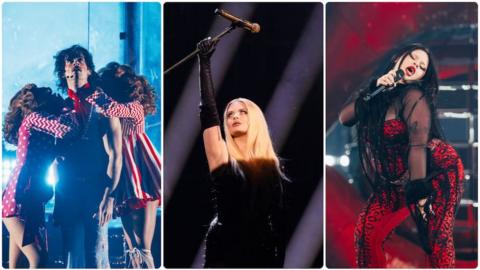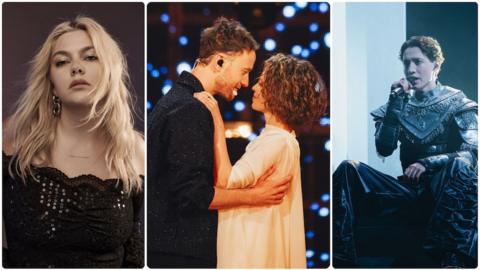The success of "goth gremlin witch" Bambie Thug at last year's Eurovision has conjured a veritable coven of imitators in 2025.
Polish singer Justyna Steczkowska, representing her country for the second time, even includes a Slavic magic spell in her song, Gaja – summoning the spirit of the mother Earth to "cleanse" her of a toxic relationship.
It's a suitably intense performance, with Justyna singing long sustained notes and playing a furious violin solo, before being hoiked into the rafters on a pair ropes.
What a time to be alive.
Marko Bošnjak, meanwhile, is cooking up a Poison Cake to feed to his tormentors - chiefly the people who bombarded him with homophobic hate messages after he was selected to represent Croatia.
The criticism was so intense that he lost his voice and couldn't leave the house for five days.
His song is suitably melodramatic, replete with guttural synths and creepy playground chants. It's a little overbaked, but should still sail through to the finals.
Taking a more ethereal approach are Latvian group Tautumeitas, whose song Bur Man Laimi translates as "a chant for happiness".
Reminiscent of Bjork and Enya, its overlapping folk harmonies are based on traditional Latvian wedding songs, making it one of this year's most captivating entries. I fear it may be too subtle to score well, though.
Further mystery is provided by, Theo Evan, Cyprus's answer to Nick Jonas. The lyrics to his song, Shh, are a riddle, written by former tennis player Elke Tiel, whose "hidden truth will only be revealed on the Eurovision stage in May".
He opens his performance perched between two pieces of scaffolding in a recreation of Leonardo da Vinci's famous Vitruvian Man sketch – so there's a clue.
Shh is one of a number of gothic pop songs, sung by brooding young men with interesting hair.
Among the best is Kiss Kiss Goodbye, by Czechia's Adonxs, who divebombs from an angelic falsetto to an unsettling baritone as he confronts his absent father.
Lithuanian band Katarsis are an interesting experiment, with a deliberately downbeat rock song that declares "the foundations of everything have begun to rot".
Titled Tavo Akys (your eyes), it builds to a compelling climax, but it's hard to see it being a vote-winner, unless Eurovision suddenly attracts an audience of depressed emo teens.
Rounding out the field are Armenian singer Parg, with the Imagine Dragons-inspired Survivor and Serbia's Princ, whose overwrought ballad is called Mila.
Both performers give it their all, but the songs don't feel strong enough to survive the semi-finals.








